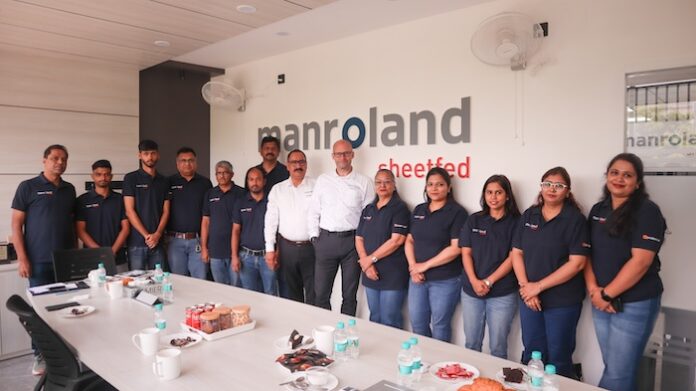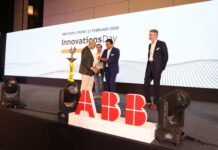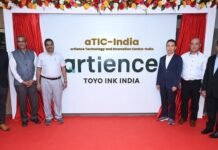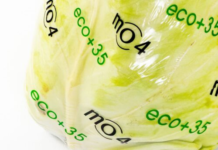
Manroland Sheetfed India inaugurated its new office in Dwarka, New Delhi, on the morning of 9 September 2025. The event was attended by Mirko Kern, CEO of Manroland, Deepak Walia, managing director of Manroland Sheetfed India, the company’s team of engineers, technicians, and members of the press.
The discussion revolved around Manroland’s latest installations in India, customer service initiatives, the demand for new and used presses, the shift toward automation, tariff-related challenges, and the growing scope for the company’s packaging business in India.
According to Kern, India has emerged as one of the most promising markets for Manroland, particularly in packaging. He pointed out that India’s packaging industry continues to expand, actively investing in new machines. “In the past, India was primarily a market for used machines, but this is changing. Today, many companies want the latest technology and are directly investing in new presses, especially for packaging,” he said.
Walia mentioned that over the last three years, Manroland Sheetfed has managed nearly 16-17 installations in India, a large share of them packaging presses. “Certain renowned packaging converters have installed multiple Manroland presses recently.”
Kern said Manroland’s Evolution series is at the center of the company’s growth strategy in India. The presses are equipped with advanced automation, inline quality control, and high-speed production capabilities – making them particularly suitable for packaging applications.
“We have installed two presses each year from 2023 to 2025 and have huge expectations for 2026. The first Evolution press was installed in Yash Packaging, Gujarat, and we already see strong momentum. By 2027, we expect to achieve double-digit installations in India,” Walia stated.
Adding that customers in India are increasingly recognizing the efficiency benefits of automated make-readies and high-performance presses, he said, “We have seen a make-ready reduction from 15 minutes to just 6-7 minutes on some installations. For packaging converters handling frequent job changes, this makes a huge difference.”
Walia pointed out that Indian customers are beginning to embrace features such as inline cold-foil application, logistics, and auto-check systems. However, he acknowledged that cultural and mindset shifts are needed. “Some still think a 15-minute make-ready versus six minutes makes no difference. But when the market moves to 3-4 minutes, they will follow. India will buy automation, maybe in another 4-5 years, in a big way,” he predicted.
At Galaxy, a Manroland Evolution press achieved over 50 million impressions in just 18 months. “These numbers highlight the reliability and productivity of the Evolution platform in high-volume packaging environments,” Walia said.
Premium finishing and sustainable packaging
Walia mentioned that the Manroland presses already support inline cold foil, double coating, and advanced quality control systems, all of which are becoming increasingly relevant for packaging printers supplying to global brands. “Export-driven converters, especially those supplying to the US and Europe, are under pressure to adopt eco-friendly production. Whether it is sustainable coatings, recyclable substrates, or reducing waste, packaging customers are demanding greener solutions.”
Kern added that while features such as gold foiling are still niche, they generate significant value when used strategically. “Even if foiling units run for only 30 days a year, the premium they generate often covers the investment. These are the kinds of value-added applications that packaging converters will increasingly adopt,” he said.
Vijay Kumar, head of service, Manroland Sheetfed, said the company has built a team of 14 engineers, most of whom have undergone rigorous training at the Offenbach headquarters, adjacent to Frankfurt in Germany. Customer service programs such as ProServ 360 have further upped confidence, minimizing breakdowns and ensuring preventive maintenance. Walia stressed that service responsiveness is one of the company’s biggest differentiators in India.
Tariff hurdles
Kern, in the press briefing, highlighted a cautious note when speaking about global trade dynamics, particularly the recent tariffs. He explained that the tariffs are a major challenge in markets such as the United States, where import duties on German and Japanese printing presses have risen sharply in recent months.
“The main problem is that the tariff is only valid when the machine enters the country. So if we sign a contract today for a machine worth a few million Euros, the customer does not know what the final tariff will be when it arrives in 6-9 months. It could be 5%, 10%, or 15%. On a 3-4 million Euros machine, that uncertainty makes a huge difference,” Kern said. This unpredictability, he admitted, has dampened investments by printers in the US market.
On India’s trade policy front, Kern welcomed the ongoing EU-India Free Trade Agreement (FTA) negotiations, which could potentially reduce tariffs on heavy machinery imports. “If the tariffs come down, it will be a big movement for us. India is already one of the most important markets for us globally, and such a step would accelerate investments,” he added.
Manroland Sheetfed’s leadership emphasized that despite tariff concerns globally, the company remains optimistic about its India prospects. The demand for new presses, coupled with interest in used machines, ensures a broad market base. With automation expected to play a transformative role in the coming years, Manroland aims to broaden its presence.
As Walia concluded, “Our growth is sustainable because it is profitable. The scope in India is huge, and with the right mix of machines, service, and consumables, we will continue to strengthen our presence.”
Profitable and sustainable growth in India
Despite heavy price competition in India, Manroland Sheetfed India has been consistently profitable. The company’s revenue mix includes not just new presses, but also used presses, agency business, spare parts, and consumables. “We may not yet lead in market share, but we have doubled our business in the last three years. Importantly, it is sustainable growth, with profitability every year,” Walia pointed out.
By offering spare parts and servicing for older presses, the company has strengthened its aftermarket base, ensuring a steady revenue stream while building relationships with converters who may eventually upgrade to new Evolution presses.










